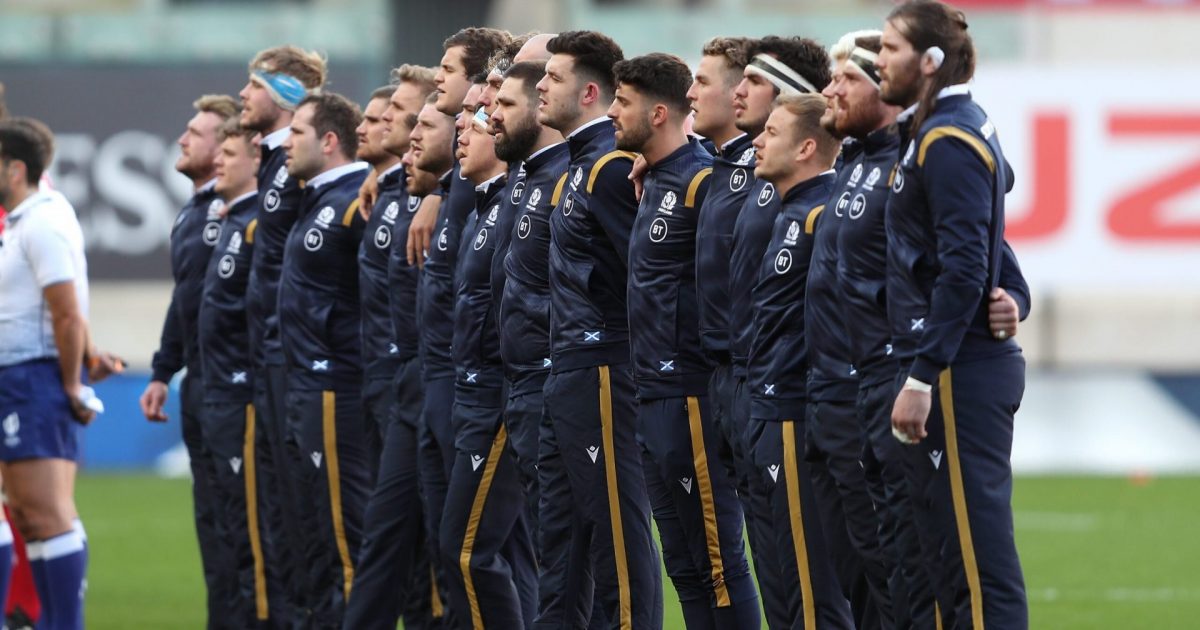Head Coach Gregor Townsend has updated the Scotland squad for the forthcoming Autumn Nations Cup. Scrum-half Sam Hidalgo-Clyne is named as the only new addition from Townsend’s original selection at the beginning of October, while winger Sean Maitland returns to the squad having not been available to be selected for the Guinness Six Nations finale against Wales last weekend.
Hidalgo-Clyne links up with Exeter Chiefs teammates Stuart Hogg, Jonny Gray and Sam Skinner in the Scotland camp having helped his club win the European Rugby Champions Cup and the English Premiership double in the past few weeks.
Stand-offs Finn Russell and Adam Hastings both sustained injuries in the concluding Guinness Six Nations match against Wales in Llanelli on Saturday and as a result will miss the rest of the 2020 autumn programme on account of groin and shoulder injuries respectively.
Hastings will require surgery and could be out for up to four months, while Russell’s groin injury can be managed through rest and rehab and he will return to the care of his club, Racing 92, with recovery time expected around two months.
Richie Gray, Rob Harley and Ratu Tagive have been released back to Glasgow Warriors.
Head Coach Townsend said: “It’s obviously disappointing to lose two quality players like Finn and Adam, who had both been playing well. However, this provides an opportunity to other players come into the team and lead our attack. The squad adapted well at the weekend to the enforced changes and we have belief in those in our squad that can step up to play at stand-off.
“We welcome Sam Hidalgo-Clyne into camp after a successful time with Exeter Chiefs and he will add further competition at scrum-half.”
With the COVID-19 pandemic still affecting many aspects of public life in Scotland the move by the Scottish Government to a new tiered level of restrictions on travel and households meetings across the country means it will not be possible to host spectators at BT Murrayfield in Edinburgh for the Autumn Nations Cup in November.
Scottish Rugby has consulted with the Scottish Government regularly on this matter and they agree it will be unlikely crowds will be possible in the coming weeks, due to the restrictions now in place.
Scottish Rugby is disappointed supporters won’t be able to come to the stadium this autumn, but consultation continues with the Scottish Government in the expectation crowds can return at some capacity soon and specifically for the 2021 Guinness Six Nations, should the public health guidelines allow.
The Autumn Nations Cup begins in November with Scotland in Pool B, featuring games against Italy (14 November in Rome) before hosting France (22 November) and Fiji (28 November) at BT Murrayfield.
Scotland squad for the Autumn Nations Cup
FORWARDS (20)
Simon Berghan (Edinburgh) – 27 caps
Jamie Bhatti (Edinburgh) – 15 caps
Fraser Brown (Glasgow Warriors) – 52 caps
Blair Cowan (London Irish) – 17 caps
Scott Cummings (Glasgow Warriors) – 14 caps
Cornell du Preez (Worcester Warriors) – 9 caps
Matt Fagerson – (Glasgow Warriors) – 7 caps
Zander Fagerson (Glasgow Warriors) – 31 caps
Jonny Gray (Exeter Chiefs) – 58 caps
Nick Haining (Edinburgh) – 4 caps
Oli Kebble (Glasgow Warriors) – 2 caps
Stuart McInally (Edinburgh) – 39 caps
Willem Nel (Edinburgh) – 38 caps
Jamie Ritchie (Edinburgh) – 20 caps
Sam Skinner (Exeter Chiefs) – 7 caps
Rory Sutherland (Edinburgh) – 9 caps
Blade Thomson (Scarlets) – 6 caps
Ben Toolis (Edinburgh) – 26 caps
George Turner (Glasgow Warriors) – 9 caps
Hamish Watson (Edinburgh) – 34 caps
BACKS (15)
Darcy Graham (Edinburgh) – 13 caps
Nick Grigg (Glasgow Warriors) – 9 caps
Chris Harris (Gloucester) – 20 caps
Sam Hidalgo-Clyne (Exeter Chiefs) – 12 caps
Stuart Hogg (Exeter Chiefs) CAPTAIN – 77 caps
George Horne (Glasgow Warriors) – 14 caps
Sam Johnson (Glasgow Warriors) – 13 caps
Huw Jones (Glasgow Warriors) – 25 caps
Blair Kinghorn (Edinburgh) – 23 caps
James Lang (Harlequins) – 4 caps
Sean Maitland (Saracens) – 48 caps
Ali Price (Glasgow Warriors) – 34 caps
Scott Steele (London Irish) – 1 cap
Duhan van der Merwe (Edinburgh) – 2 caps
Duncan Weir (Worcester Warriors) – 28 caps








































































